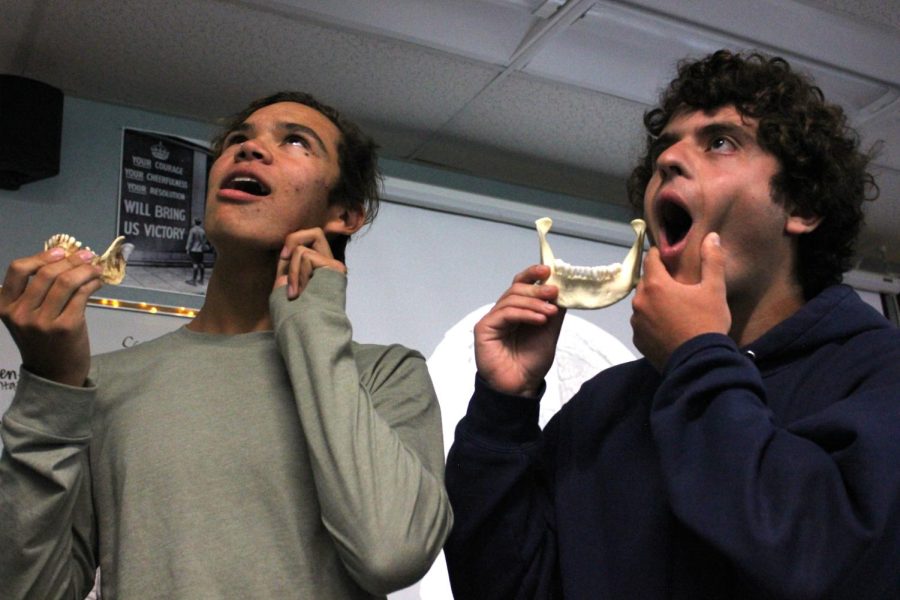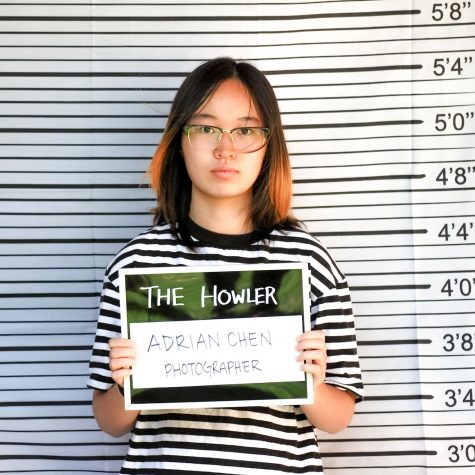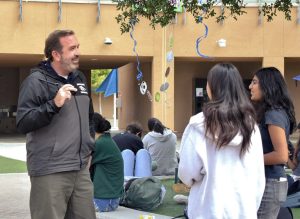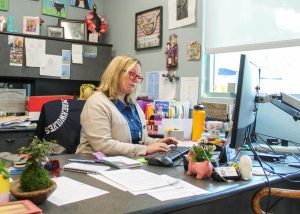Not Gonna Anthropologize for Enjoying this Class
COMPARE AND CONTRAST: Students measure the change in jaw size from previous human species to their own.
May 31, 2022
Whether it be eating rice with a spoon, fork or chopsticks, human culture is intricate and ever-changing, even since the times of our parents. This change is something that juniors and seniors can now study in the new Anthropology class at Northwood.
Taught by history teacher Emily Rhodarmer, Anthropology is a semester-long course that teaches students about archaeology, human evolution and cultural growth and development.
“I studied anthropology in college and really enjoyed the classes myself as it changed how I look and interacted with other people,” Rhodarmer said. “I thought that students could benefit from such a class.”
The class starts with biological anthropology, which teaches the origins of humans as primates. The unit allows students to look at replicas of skulls including gorillas, neanderthals and modern humans. It also teaches these students how to identify the skulls based solely on their traits and determine which species it came from.
Biological anthropology is also the only unit with a test, with the other two units having small projects instead.
“I have one word to say: Monkey,” senior Athanasios Syrengelas said. “It was interesting to learn about the identifying factors of skulls like the foramen magnum and supraorbital ridge which are terms I learned from taking this class.”
After biological anthropology, students begin the archaeological unit, where they learn about how archaeologists excavate sites and remove artifacts from these sites. Students also get to experience what it is like to repair pottery after it is shattered. The unit then culminates into students doing a presentation on an archaeological dig site.
“I liked how the archaeology unit was very hands-on,” junior Joe Harker said, “It had us do research for real world sites while the pot reconstruction gave us a firsthand look at how archaeologists actually work. Plus the lectures were the most interesting of the class.”
Cultural anthropology is the final unit, where students learn about human culture. Human culture is not just differences between nations but also cities and individuals within families. The best example used by Anthropology is: how does one eat their rice? With a fork, spoon or chopsticks? The unit will teach you about the difference between cultures and how to not only accept them but also experience them yourself.
“My favorite unit was cultural anthropology,” junior Toby Cole said. “It allowed me to focus on things that matter to me like learning about various cultures and doing an actual project on analyzing Northwood culture.”
Anthropology gives students the opportunity for self-reflection, to learn about themselves just as much as they learn about human history. While the lessons taught in the course teach students about the past, it gives them the knowledge to understand the present and then to ultimately contribute to the future.



![AAAAAND ANOTHER THING: [CENSORED] [REDACTED] [BABY SCREAMING] [SIRENS] [SILENCE].](https://thehowleronline.org/wp-content/uploads/2025/06/lucy-1200x800.jpg)






















































![AAAAAND ANOTHER THING: [CENSORED] [REDACTED] [BABY SCREAMING] [SIRENS] [SILENCE].](https://thehowleronline.org/wp-content/uploads/2025/06/lucy-300x200.jpg)